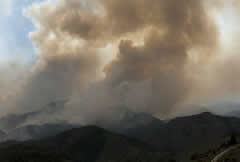Too Darn Hot

In most areas of the U.S. right now, it’s just too darn hot. If you’re in the scary position of having to evacuate due to a nearby wildfire, but lucky enough to come home to a house still standing, consider this:
- Nearby flames, smoke and extreme heat can impact a home’s air quality and create health hazards that you may not be able to see or smell.
- Qualified health and environmental safety experts can help you determine whether it is safe to move back into your home after a wildfire. Contact your local health department or visit their website if you have questions.
- Unless an insurance company adjuster has special training and conducts appropriate testing, he/she is not qualified to determine whether your home is habitable.
- Indoor air quality and home environment health standards vary and there does not appear to be one official, clear and established set of guidelines for smoke, soot and ash contamination and proper cleaning methods.
- If there are members of your household who have chemical sensitivities, a history of respiratory illness, or are immunosuppressed, notify your insurer and consult with a physician before moving back in.
- A reputable and qualified Certified Industrial Hygienist (CIH) can inspect and test the air, surfaces and “soft goods” (furniture, rugs, curtains, etc.) in your home. Check qualifications and references carefully.
- Communicate with your insurer in writing if you believe your home may not be safe to live in and provide them with supporting documentation. Request that they cover the cost of appropriate inspection, testing and remediation and Additional Living Expenses for the time period required to complete those three tasks. Be prepared to enforce your rights if an adjuster or insurer rejects your request to cover necessary costs.
- We’re hearing that some insurers are being extra tough on proof requirements for health-related smoke claims because they fear an overload.
We hope your home is safe and sound that you’ll never need our recovery support, but if you do, United Policyholders has helped guide disaster survivors on the road to recovery for over twenty years. We offer tips on partial losses and damage from extreme heat and here’s what we’re up to in Colorado and New Jersey.
